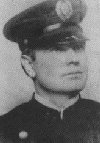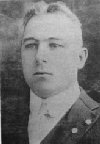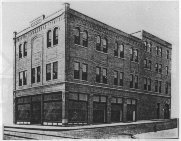"We are banded together for our own enjoyment!"
- September 17, 1915
|
A ride on a Pittsburgh Railways trolley car cost a nickel,
you could enjoy a silent movie for a dime, and radio was unheard
of. If your parents had a telephone it probably was a "party
line" which you shared with someone else. The Blue Laws
were strictly obeyed and a lady only went into a saloon when
it had a back room with a separate entrance. If you owned a motor
car it set jacked up in the garage all winter. The article could
go on and on but we are leading up to something dearer to our
heart.
Police were forced, at times, to work twelve hours a day, three hundred sixty-five days a year and no thought of being paid overtime. Their patience were worn thin and were ready to organize so as a group they would have strength in seeking justice for their plight. During the Spring of 1915 Martin Toole and Delbert Nagle met nightly at the corner of Second and Flowers Avenue, Hazelwood, and would discuss the problems of the police officer. One particular evening the conversation was about organized labor and suddenly Toole blurted out "What do you say about trying to organize the police?" Nagle replied "What the devil are we waiting for. Let's go." Considerable planning had to be done in a very secretive manner for if their plans were known "heads could hit the chopping block." Twenty-three men met in secret at 9:00 A.M. at the Wabash Station Building, Ferry Street and Liberty Avenue, Friday, May 14, 1915. It was at that meeting that the name Fraternal Order of Police was adopted. Temporary Officers were elected until such time when a Charter for the organization was granted. Twenty-three was adopted as the pass word for the group. This was in recognition of the twenty-three men who realized that they were sticking their necks out. They were determined to have a police organization regardless of the consequences. Police Superintendent Noble Matthews learned of the meeting that afternoon and was furious. He threatened to sharpen his ax but it was a waste of his time and no doubt played havoc with his blood pressure. History relates after hearing what was in the wind he sent a policemen to Toole's home instructing him to report to headquarters immediately. Marty obeyed the order and told him what had transpired. According to Toole, Matthews called him an agitator and what ever else came to mind at the moment. He wanted to know why Marty did not talk with him before starting such nonsense. Marty gave him several plausible reasons but he did not wish to hear any of them. Marty further explained that at the next meeting a committee would be formed to talk things over with him. That blew the cork out of the bottle for Matthews screamed "Oh - so you are going to have another meeting huh, how many men have taken part in this?" Matthews had a dizzy spell when told that over 300 men were actively involved. After regaining his composure he exploded again saying "get out of here, get out and break it up. Do you hear, break it up at once." Marty made no reply but left the office. Their next important move was to contact Mayor Joseph G. Armstrong and explain directly to him what they had in mind. Superintendent Matthews had to be shown the light of day and labor oriented Mayor Armstrong was the man to enlighten him. According to research Mayor Joseph G. Armstrong, an active member of the Flint Workers Union, helped with the original planning of Pittsburgh Fire Fighters Local No. 1. They were formed May 5, 1903.
At a meeting Wednesday, November 17, 1915 Attorney Robert G. Woodside read the Charter granted earlier that day by Judge Thomas J. Ford of the Court of Common Pleas of Allegheny County, Pennsylvania. Immediately plans were formulated to lobby City Council for a reduction of the 365-day work schedule. Council realized that action must be taken on the F.O.P.'s complaint and passed an ordinance Monday, October 9, 1916 giving police officers two days off each month with pay. Other police departments took notice and they began to organize under Pittsburgh's leadership. State Lodges were established and then the Grand Lodge was formed to encompass the United States. From the original 23 members the membership now totals over 222,000 and there are 1,848 local Lodges and one in Dublin, Ireland. At the 5th Annual National Convention, held August 15-18, 1921, at Reading, Pennsylvania, Joseph G. Armstrong was introduced to the assembled body as "The ex-Mayor of Pittsburgh who is the father of the Fraternal Order of Police." When Kathryn M. Milton died in 1960 she was referred to in the National Journal as "The Mother of the Fraternal Order of Police."
|
||||||||||



